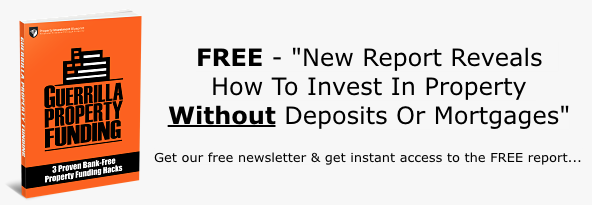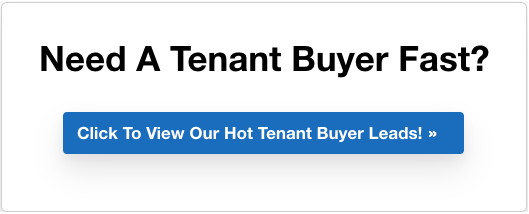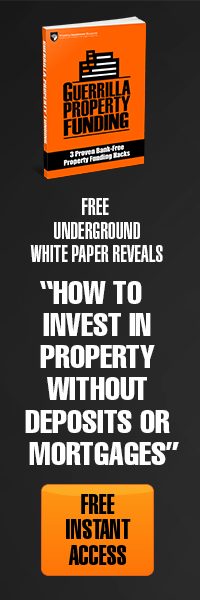
Investing with Lease Options: too RISKY?
Video transcript
So today we're going to be looking at the risks of investing with lease options: a question that was asked by one of our subscribers, Adam. Adam's business partner is wondering: what is the catch with lease options -- they seem a bit too good to be true. I know exactly how Adam's business partner feels; that's exactly how I felt when I first encountered lease options. But, what I found is that on the contrary: they're actually a lot more secure; less risky than traditional buy to let. And I'm just going to tell you why that is the case. I'm just going to switch over to a presentation here otherwise I'll forget what I'm talking about, so here we go.
Investing with lease options: Risk #1
Okay, so, the first possible risk of investing with lease options that you might think of is rent. What happens if the tenant -- or tenant buyer in the case of a lease option -- fails to pay the rent or the monthly payment? So what happens with a buy to let? Obviously if you've got a mortgage, if the tenant doesn't pay, then you have to find funds to pay the mortgage yourself otherwise you’ll end up defaulting and possibly getting the place repossessed.
What happens when you have a lease option? If you've taken an option on someone else’s property and you're selling it on to a tenant buyer, then you're in a similar situation. Except it's someone else's mortgage that doesn't get paid. Obviously, you have agreed to make the payments on that mortgage so you're going to want to make sure that they get paid. Just like a buy to let, you've done your due diligence beforehand and you know that you've got a decent investment there so you don't want to let it go.
Now which is more likely is my next question: a tenant defaulting or a tenant-buyer? Now I would say that with a lease option, it is less likely that your tenant buyer is not going to pay the rent. Why is that? Well, the one big reason is that they have usually put down a large chunk of cash upfront as a deposit towards the purchase of this property -- often two or three percent or possibly more -- of the purchase price on that property. They know that if they don't pay their rent, if they don't keep up on the payments, they will risk losing that upfront payment.
If it's just a renter in a buy to let then there's a lot less at stake there. Also, with a lease option, your tenant buyer has a buyer mindset so they're a whole different type of prospect than your normal renter. Now we've said it's more unlikely for a tenant-buyer to default on the rent. In the unlikely event that they do, what would you do? Your legal paperwork would say that you get the property back; the tenant has to leave if they don't pay their monthly payment. So, what can you do? You can just get another tenant buyer in there.
When you did your original marketing you will have had a bunch of leads of people looking to buy that property. You just go back to your initial list, find somebody who was desperate to get it the first time but just missed out and get them into the property. What does that mean? That means another down payment. And it means you've got somebody who can pay the rent again. If they don't pay the rent and they have to leave, then it's not the end of the world.
Investing with lease options: Risk #2
Okay, so, risk number two. This is always a risk with buy to let. In the case of buy to let what happens? You're the owner so you have to pay for any repairs as it says so in the lease. Now with lease options, it's obviously an option to buy the property running alongside a standard tenancy agreement. The tenancy agreement has to say that the investor has to pay for repairs. What you find in practice though, is that again because the tenant buyer has a buyer mindset, they are not going to be phoning you about a leaky tap. They will do most repairs themselves.
If for example the property was taken on and the boiler packed in within a few weeks of them going in there, you maybe want to do the right thing and get that fixed but in general, you'll find that you will not get maintenance calls from people on lease options.
Instalment contracts -- another variation on a lease option -- often known as delayed completions or long-stop completions. With instalment contracts, it's totally different again, it's more similar to a normal purchase and there's no option: they're bound to buy the property and in that case there's no tenancy agreement, in which case, the tenant buyer pays for all repairs, no matter what. It's like they have bought the property themselves, so you’re completely covered there. So again, more risk with a buy to let, I would say on that.

Investing with lease options: Risk #3
The, the other big risk and certainly for anyone who has more than a couple buy to lets, and doesn't have fixed rate mortgages, the risk of interest rates going up is a big one and, let's face it, they can't go down that much further at the moment. So, obviously with a buy to let, when interest rates go up, your payments go up: you have to pay the payments, or you get repossessed.
With a lease option, there is less risk of this because, with a lease option you are, generally getting upwards of twenty percent more than you would on a buy to let in your monthly payment. So, that means that there's more room for the interest rates to move up and the payments to move up, so, the risk is less.
With an instalment contract, most investors will write into the contract that the payments rise and fall in line with interest rates. When interest rates go up, the payment will also go up. So again, you're completely insulated from any risk on the, interest rate side. And for that very reason I'm not going to get any more buy to lets. I feel too exposed to interest rates rising, and for that reason I'm only going with instalment contracts or delayed completions because I know that I can build in any interest rate rise into my risk reversal. So that's another big risk which is not really present with instalment contracts.
Investing with lease options: Other risks
Now, other risks… At the end of the day, you're a property investor for goodness sake! If you don't want risks, put your money in a bank! The there are risks with everything but you're a property investor, you're no doubt a bit of a risk taker and there's obviously ways of managing those risks with proper due diligence, and using the right tools.
Finally, solicitors: that's what they're there for. They do the legal documents to deal with any other unforeseen risks that might, come up like people dying or going bankrupt and things like that.
And then just finally, my mentor, as always is Rick Otton, he's the guy that I learned all my creative property stuff from. See you next time.
<< Back to Creative Investing from Investing Lease Options
<< Back to Property Investment Blueprint from Investing Lease Options




